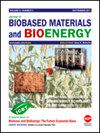Application Effect of Bacillus in Tomato Root Knot Nematode Disease Control
IF 0.5
4区 医学
引用次数: 0
Abstract
Root-knot nematode is a kind of omnivorous plant pathogenic nematode that causes great harm to underground roots and above-ground parts of plants, and has become a serious factor restricting the development of global agriculture. In order to realize the sustainable development of agriculture, the research carried out an in-depth discussion on biological control methods. Firstly, a bacillus was obtained through insecticidal experiments, then a large amount of materials was obtained through purification and cultivation, and then the stability test of the active substance of Bacillus was conducted to explore its influence to root-knot nematodes. Finally, the pot verification experiment and field verification experiment were conducted. The results showed that in the insecticidal experiment, the accumulation of active substances at 14 h was the maximum, and the corresponding mortality of root-knot nematodes at 12 h and 24 h was 97.6% and 82.91%, respectively. In the BS pot experiment, the number of tomato root knot formation in the bacillus treated group was significantly reduced by 46.3% compared with the control group, and the number of egg sac of the rhizome was reduced by 78.31%. On the 120th day of field verification experiment, the fruit quantity and yield per plant in the treatment group increased by 17.02% and 11.85%, respectively. In summary, Bacillus can effectively reduce the damage of root knot nematode to tomato plants, and has a good prospect of application and popularization.芽孢杆菌在番茄根结线虫病防治中的应用效果
根结线虫是一种杂食性植物病原线虫,对植物地下根系和地上部分危害极大,已成为制约全球农业发展的严重因素。为了实现农业的可持续发展,该研究对生物防治方法进行了深入探讨。首先,通过杀虫实验获得了芽孢杆菌,然后通过纯化和培养获得了大量材料,接着进行了芽孢杆菌活性物质的稳定性试验,探讨其对根结线虫的影响。最后,进行了盆栽验证实验和田间验证实验。结果表明,在杀虫实验中,活性物质在 14 h 的积累量最大,相应的根结线虫在 12 h 和 24 h 的死亡率分别为 97.6%和 82.91%。在 BS 盆栽实验中,杆菌处理组的番茄根结形成数比对照组显著减少了 46.3%,根茎卵囊数减少了 78.31%。在田间试验的第 120 天,处理组的果实数量和单株产量分别增加了 17.02% 和 11.85%。综上所述,芽孢杆菌能有效减轻根结线虫对番茄植株的危害,具有良好的应用和推广前景。
本文章由计算机程序翻译,如有差异,请以英文原文为准。
求助全文
约1分钟内获得全文
求助全文

 求助内容:
求助内容: 应助结果提醒方式:
应助结果提醒方式:


